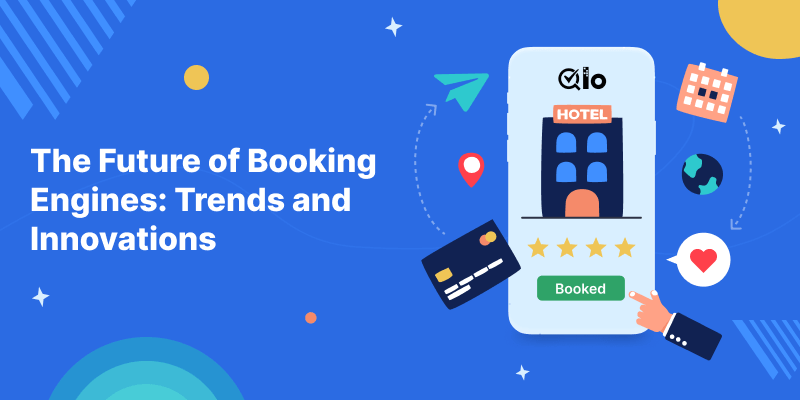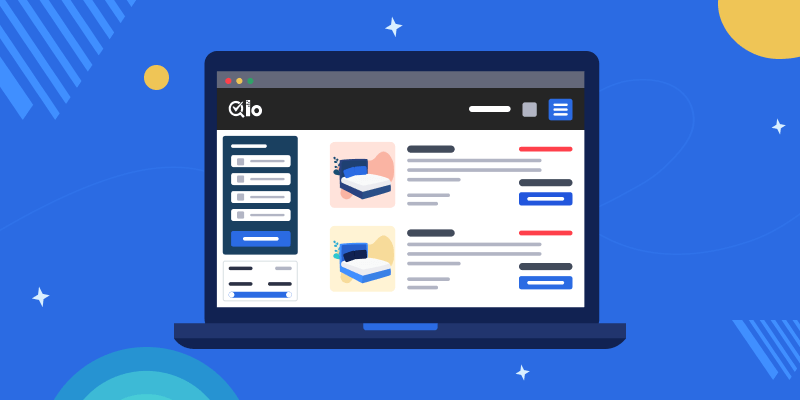One of the biggest challenges that every hotelier faces are managing reservations. A booking engine can help you with this, but it is important to stay updated with the ongoing trends.
With the help of this guide, you can stay updated with the booking engine trends and gain a competitive advantage.
What is a Booking Engine?
The booking engine is a software as a service (SaaS) application that is used by hoteliers, to provide guests with the flexibility to reserve a property online.
Booking engines consist of frontend and backend. The front end is the customer-facing part where they interact with the UI which allows them to self-book the rooms. The backend is used by the hoteliers to set up, manage, and review the reservations.

What is the need for a booking engine?
Back in the days when the internet was not commonly used, the guest had to approach to hotel to know the availability and pricing so that could plan their trips. This creates problems for both the hotel staff and the guests.
It becomes challenging for the front desk agents as they need to figure out if they have to prioritize the guest’s inquiries or handle the walk-in customers who are waiting in line to make reservations.
Also, if over-the-call guests were not satisfied with the pricing, they had to approach elsewhere. And it becomes even worse if they have to call back to the same hotel. To resolve these challenges, hoteliers have adopted booking engines.
With the booking engine, the guests can directly book the rooms from the hotel’s website. This way is much easier for the guests to book their rooms and the hotel staff doesn’t need to onboard a separate employee to handle guests’ queries.
Also, this reduces the involvement of third-party agents in managing the booking. So now, the booking is cheaper as it eliminates the agent’s commission and also saves time.
Following are the trends that every hotelier should be aware of:
Mobile Optimization for Booking Engine
With the ever-increasing demand for mobile devices, people often spend the majority of their time on their mobile devices.
So it is necessary for the booking engine providers to create a mobile-friendly interface. This will help the users to make reservations on the go.
Integrate your Booking Engine with AI
Nowadays everyone is dependent on AI for their day-to-day tasks and the hospitality industry is no exception. The booking engines are now integrated with AI tools which helps them to provide guest personalization.
Also, the booking engines can be integrated with AI to provide automated chatbots. This helps to handle customer queries with ease.
If a user finds a booking engine that is complex to use, the AI bots can guide the booking process with every step.
Booking with Loyalty Programs
In the early days, the booking engine was a place to reserve a room. But now things have changed a lot. Today we can see many booking engines are used to upsell.
They have been used to upsell guests on services like restaurant reservations, SPA treatments, and tickets to events. We can expect this trend to increase significantly.
As the hospitality industry is always looking for ways to increase its revenue, the booking engine is a place they need to be focussed on.
So, the hospitality businesses are moving towards the Loyal programs. They have an expected ROI and provide businesses with a lucrative incentive to retain guests.
However, integrating loyalty programs into the booking engines isn’t always easy. You need to be aware of easy steps to create a loyalty program.
What’s more challenging is its functionality is limited to allowing guests to use the points to book their room instead of actually paying.

Advancement of Booking Engine
Usually on a booking engine, if a guest initiates a booking but for any reason doesn’t complete it, nothing happens. The guests need to fully complete the process of booking. But now we have more advanced booking engines which are monitoring the steps of the booking and keeping follow-ups with them to remind the customers of the booking.
Moreover, they can detect what exactly guests are facing which prevents them from completing the booking. If the guest finds the pricing of a room is a bit on a higher level, the booking engine will send them an email regarding the promotional offers.
If the guests are confused with the steps to complete the booking, the booking engines can send them instructions guide so that they can complete the process.
Booking engines can also create urgency for the guests so that they can book the room. They can display text to guests like “Only 2 rooms are left for this price” or “We are holding this room for the next 15 minutes”. These tactics help to reserve a booking in this highly competitive environment.
Conclusion
In this article, we looked at important trends in a hotel booking engine.
In this highly competitive sector, it’s important to know how to utilize your booking engine that enhance your property’s ability to sell more rooms directly,
By attracting more guests to your website, your hotel can increase its online presence which in turn increases your business.
Get in touch with us!
If you are a hotelier and looking for software for your hotel, One Property Management that I recommend is QloApps – A Free hotel booking software
QloApps also offers various other hospitality technology services such as Channel Manager, Cloud PMS (QloSaaS), 100+ Addons, Revenue management, Data analytics, and many more.
If you have any suggestions, kindly share them on the QloApps forum.
For any technical assistance kindly raise a ticket.

Be the first to comment.